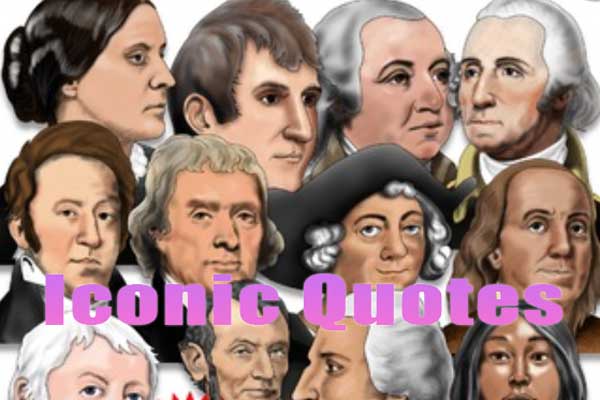We have many historical figures who have changed our lives with their smart thoughts and sayings. Its what they have quoted about life is motivating, inspiring, and making people understand in a lot of ways. So, today we are going to explore some Historical figures and their iconic quotes.
Throughout history, certain individuals have articulated ideas and sentiments so powerfully that their words have endured long after their time.
These quotes, often uttered in moments of great significance, encapsulate profound truths and have had lasting impacts on society and culture.
Here, we explore the context and enduring influence of some of the most iconic quotes from historical figures.

Historical Figures and Their Famous Quotes
These Historical iconic quotes have helped thousands of people with their lives. However, besides these important ones, we have special girl quotes for Boss Babe.
René Descartes
“I think, therefore I am.”
René Descartes, a French philosopher and mathematician, famously declared, “Cogito, ergo sum” (“I think, therefore I am”) in his 1637 work, “Discourse on the Method.” This statement became a fundamental element of Western philosophy, asserting that the act of thinking is proof of one’s existence.
Descartes’ emphasis on reason and doubt laid the groundwork for modern philosophy and the scientific method, influencing the Enlightenment and shaping contemporary thought on the nature of self and consciousness.
Franklin D. Roosevelt
“The only thing we have to fear is fear itself.”
In his first inaugural address on March 4, 1933, amidst the Great Depression, Franklin D. Roosevelt sought to reassure a nation paralyzed by economic despair. By stating, “The only thing we have to fear is fear itself,”
Roosevelt aimed to restore confidence and motivate collective action. This quote became a cornerstone of his presidency, embodying his efforts to combat the Depression through the New Deal programs.
It remains a powerful reminder of the importance of courage and resolve in facing crises.
Marie Antoinette
“Let them eat cake.”
Although often attributed to Marie Antoinette, the French queen, there’s no historical evidence that she actually said, “Let them eat cake” (“Qu’ils mangent de la brioche”).
This quote is believed to have been fabricated to exemplify the perceived indifference of the aristocracy towards the plight of the poor during the French Revolution.
Whether true or not, the phrase has become emblematic of the disconnect between the ruling class and the common people, illustrating the tensions that led to the revolution and the downfall of the monarchy.
Julius Caesar
“I came, I saw, I conquered.”
After a swift and decisive victory at the Battle of Zela in 47 B.C., Julius Caesar reported to the Roman Senate with the succinct phrase, “Veni, vidi, vici” (“I came, I saw, I conquered”).
This statement highlighted not only Caesar’s military prowess but also his efficiency and determination. It has since become synonymous with swift and overwhelming success, cementing Caesar’s legacy as one of history’s greatest military leaders and expanding the influence of the Roman Empire.
William Shakespeare
“To be or not to be, that is the question.” –
In William Shakespeare’s play “Hamlet,” the titular character famously ponders, “To be or not to be, that is the question,” in a soliloquy that delves into the nature of existence and the human condition.
Written around 1600, this line has transcended its literary origins to become a profound philosophical inquiry about life, death, and the choices we face.
Shakespeare’s ability to capture the essence of human struggle and introspection ensures that this quote remains relevant in discussions of philosophy and literature.
John F. Kennedy
“Ask not what your country can do for you—ask what you can do for your country.” –
In his inaugural address on January 20, 1961, President John F. Kennedy challenged Americans with the stirring call, “Ask not what your country can do for you—ask what you can do for your country.” This exhortation was meant to inspire a sense of civic duty and public service during a time of Cold War tensions and societal change. Kennedy’s words have continued to resonate, encouraging public service and a spirit of collective responsibility in subsequent generations.
Mahatma Gandhi
“An eye for an eye leaves the whole world blind.” –
Although not directly quoted from his writings, the phrase “An eye for an eye leaves the whole world blind” encapsulates Mahatma Gandhi’s philosophy of nonviolence and forgiveness. Gandhi advocated for peaceful resistance against British colonial rule in India, emphasizing that retaliation and revenge only perpetuate cycles of violence. His teachings have profoundly influenced civil rights movements worldwide, reinforcing that nonviolence is a powerful tool for achieving social and political change.
Ok, in case you feel bored with all this important information and quotes, you can explore our funny Yosemite Sam Quotes from Looney Tunes
Conclusion
The quotes from these historical figures, born out of significant moments in history, encapsulate profound insights and ideals that continue to shape our world.
By understanding the context in which these words were spoken, we gain a deeper appreciation for their enduring impact and the timeless wisdom they convey.
These iconic sayings remind us of the power of words to inspire, provoke thought, and drive action across generations.
I hope you liked this post. Share with your friends and Visit Quote Lander for more.